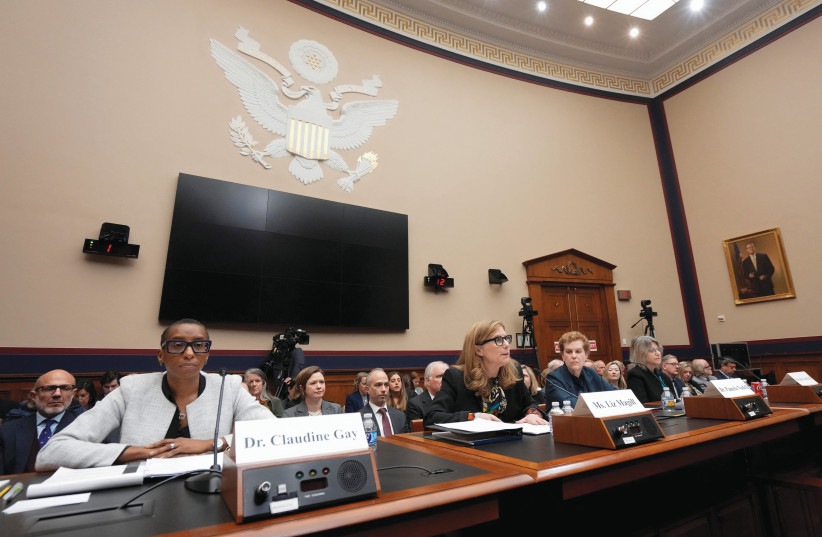By now, we’ve all watched that travesty of a congressional hearing on antisemitism in US campuses and the trainwreck testimonies from the presidents of Harvard, University of Pennsylvania, and MIT.
“Does calling for the genocide of Jews violate Harvad’s rules of bullying and harassment, yes or no?” asked Congresswoman Elise Stefanik.
“It can be, depending on the context.”
Penn’s leader, Liz Magill, refused to answer multiple times before she ended with “a context-dependent decision.”
All three presidents echoed this terrible answer, and the backlash erupted almost immediately.

Magill stepped down within days of delivering a lame apology in a video distributed on social media.
MIT President Sally Kornbluth attended the screening of Hamas’s atrocities on October 7 with 40 faculty members; although even that does not make up for the damage done.
Harvard’s governing board, however, announced that it stood firmly behind Claudine Gay as the university president.
Ivy League antisemitism is nothing new
As upsetting as the testimony by the presidents was to watch, it is nothing new to the Jewish community. Ivy League schools – which include Harvard and Penn – have long and well-documented histories of antisemitism, especially Harvard.
In 1909, a future Nazi named Ernst “Putzi” Hanfstaengl graduated from Harvard University. He would later move to Germany with his wife and begin a close friendship and political association with Adolf Hitler. Hanfstaengl would later fund publication of Hitler’s Mein Kampf and the antisemitic Völkischer Beobachter (“People’s Observer”).
Harvard never explicitly condoned Nazism, but it subscribed to the modest antisemitism that infested elite institutions during the 20th century. Although Hanfstaengl was a rabid antisemite and his affiliation with the Nazis was well known, Harvard invited him to his 25th class reunion in 1934 and chose to ignore the outcry from Jews across America, who were enraged over the university’s invitation. Instead, Harvard decided to protect Hanfstaengl, claiming that “it is not a university’s function to incite political battles and fan the flames of international discord.”
That sounds all too familiar to those dealing with antisemitism on college campuses today. At the time, Jewish students hung posters around Harvard’s campus to raise awareness of the Nazis being honored by the institution.
This reminds me of when the University of California-Merced and San Francisco State University (SFSU) attempted to host events that included Leila Khaled, an openly acknowledged leader of the Popular Front for the Liberation of Palestine (PFLP) and is famous for being the first woman to hijack an airplane.
Harvard and many other Ivy League schools continued this pattern of protecting and enforcing antisemitism. At the start of the 20th century, Harvard implemented a system to limit the enrollment of Jewish students. Admissions officers utilized a coding system involving writing the letter “J” from one to three times, to indicate to the admissions board the likelihood of applicants being either potentially, probably, or highly likely Jewish.
You can find these documents in the online Harvard archives, where a chart of potential candidates is listed, some of them labeled with the letter “J.” Harvard’s president at the time, Abbott Lawrence Lowell, raised the issue of a “Jewish problem” when the percentage of Jewish students grew from 6% to 22% between 1908-1922.
Other schools would follow suit with policies designed to limit the number of Jewish students, reflecting the antisemitic attitudes prevalent at the time.
Yale maintained restrictions on Jewish admissions for an extended period, persisting well into the civil rights movement of the 1960s. Columbia University and Cornell University, members of the Ivy League, as well as New York University and Stanford University, also restricted Jewish admissions.
These antisemitic quotas were also prevalent in prestigious Canadian universities such as McGill University, Université de Montréal, and the University of Toronto’s Faculty of Medicine. These schools had long-standing Jewish quotas, with McGill’s remaining in place until the late 1960s.
It seems that these universities have not learned any lessons from their antisemitic Jewish quota policies or their protection of Nazis. Today, many campuses are giving antisemitic, pro-Hamas speakers a platform and whitewashing the calls for Jewish genocide on their campuses.
While they pretend to uphold equality and push for progressive thoughts and values, their leadership is repeating the same archaic and discriminatory practices they once upheld. These institutions are whitewashing antisemitism and failing their Jewish students.
The writer is a social media activist with more than 10 years of experience working for Israeli and Jewish causes and cause-based NGOs. She is co-founder and COO of Social Lite Creative, a digital marketing firm specializing in geopolitics.
